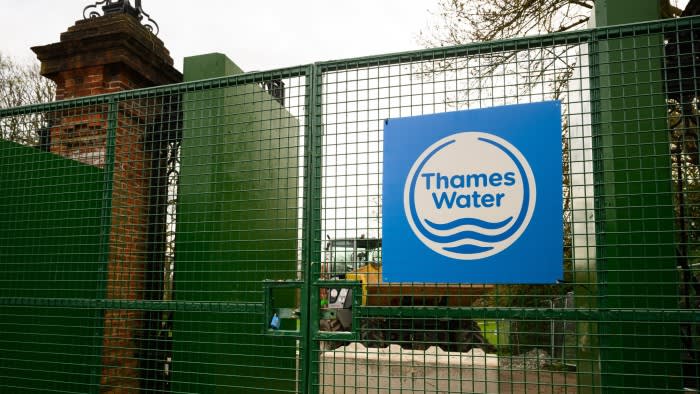Unlock the Editor’s Digest for free
Roula Khalaf, Editor of the FT, selects her favourite stories in this weekly newsletter.
Thames Water shareholders backed away from supporting the group after the UK regulator demanded they slash the company’s debt pile and make other structural changes they calculated would cost as much as £8bn.
The backtracking last month on previous commitments to invest £500mn in the troubled utility capped weeks of tension between Ofwat and Thames Water’s shareholders, which include the sovereign wealth funds of China and Abu Dhabi.
The investor resistance to Ofwat’s demands precipitated a default by Thames Water’s parent company last week.
A private letter sent by the regulator on March 11 demanded that in addition to reducing group debt and improving infrastructure, shareholders consider a stock market listing and breaking up the utility, according to two people with knowledge of the demands.
Investors had previously put forward a plan, rejected by Ofwat, whereby they would inject £3.25bn of equity, reinvest company profits, take no external dividends and deliver £18bn in investment by 2030.
Instead, Ofwat stipulated that Thames Water reduce its gearing ratio — a measure of debt in relation equity — from around 80 per cent at present to 75 per cent by the end of 2030, before a further reduction to 70 per cent by the end of 2035. Shareholders calculated that together with other conditions, this would take the amount of new money they needed to pour into the business to more than £8bn, the people said.
The investors — which also include pension funds Omers of Canada and Britain’s USS universities scheme — announced two weeks after Ofwat’s letter that the business was “uninvestable” and backtracked on a commitment to invest a further £500mn. They then signalled that they were willing to withdraw and take an estimated £5bn loss. By April 5, Thames Water’s parent group said it had defaulted on payments on a £400mn bond.
The company, which provides water services to 15mn people in England, is now facing a messy debt restructuring or even the prospect of a temporary renationalisation under the government’s special administration regime. It has meanwhile become a lightning rod for public anger over sewage pollution and mistrust of England’s privatised water system.

Thames Water’s shareholders were blindsided by Ofwat’s new conditions, according to the people familiar with the discussions, and felt that the regulator was trying to apply them without a proper consultation process.
The investors’ initial proposals to Ofwat would have meant a 56 per cent increase in bills, including inflation, by 2030. They had also asked for limits to regulatory fines because they deplete cash available to deliver much-needed improvements to infrastructure.
In a presentation to investors in December, Thames Water forecast that its gearing ratio was set to rise to 84 per cent at the end of 2025, even if shareholders injected a further £750mn of equity into the business by then.
“Ofwat has refused to acknowledge that its regulatory model gives the company absolutely no breathing space, nor the necessary funding attempts to turn itself round and deliver for customers and the environment,” said one person close to the discussions.
“The bottom line is that the regulator has a responsibility to ensure water companies should remain viable to cover costs,” he added.
The regulator is not due to make its draft decision on company business plans, including increases to customer bills, until June. A final decision will not be made until the end of the year, after which it can be contested by companies.
Thames Water has been struggling with the effect of higher interest rates on its debt but says it has enough cash to keep running for another 15 months. However, it needs billions of pounds more investment to address sewage discharges, water leakage, and storage to prevent potential water shortages.
An Ofwat spokesperson said: “We do not comment on speculation. Ofwat is continuing to work on draft determinations that will be published in June.
“We will continue to monitor Thames Water as it seeks to turnaround its performance for customers and the environment.”
Thames Water and Kemble declined to comment.
